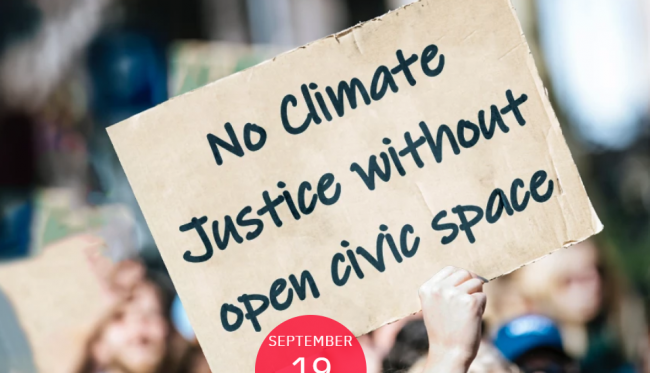
This group of independent Egyptian human rights organizations have created an ad-hoc coalition to coordinate advocacy around key civic space demands to leverage and influence the existing mobilization of the global climate movement.
The objective of the Egyptian Human Rights Coalition on COP27 is to push for key civic-space advocacy demands: the release of individuals arbitrarily detained for exercising their rights to freedom of association, assembly, and expression, and to open up civic space in Egypt. The coalition aims to use the COP27 as a hook to amplify the profiles of individuals arbitrarily detained, including HRDs, journalists, and others, not only to push for their release but also to build a positive counter-narrative to the State’s narrative that “they are in prison because they are terrorists."
Why civic space matters?
COP Civic Space wrote a statement on why civic space matters in the context of the climate crisis:
Civil society, indigenous peoples, environmental human rights defenders, trade unions and social movements across the world have worked for decades to address climate change. The pressure building towards meaningful action on climate justice, has been driven by the tireless commitment of these actors raising awareness of environmental challenges, advocating for the realization of the right to a healthy environment for all, including future generations, fighting for the needs of the most vulnerable populations to be factored into decision-making processes, and proposing solutions.
The resolution of the climate crisis lies in social, economic and institutional change requiring collective action by mobilised groups. Achieving climate justice therefore requires the full and meaningful participation of civil society, including the most marginalised groups. Civil and political rights such as the freedom of expression and the freedom of peaceful assembly and of association in addition to access to information and climate education are essential to this work, as they form the essential means through which groups of individuals including the most marginalised can gather together around shared goals of building a sustainable future. As Special Rapporteur Clément Voule puts it, “The ability of individuals to mobilize, organize and connect and to contribute to shaping public opinion and decision-making without fear […] is essential to the production of effective climate action and just transitions.”
Unfortunately, civic freedoms are being systematically violated globally in the context of climate justice. Those involved in the climate justice movement are being threatened, silenced and criminalized at alarming rates; peaceful assemblies are often met with excessive force and protesters are frequently detained, sentenced and/or face steep fines for the exercise of their rights. In addition, environmental protestors and organizations are victims of extensive surveillance by law enforcement and of smear campaigns and public vilification that seek to discredit and erode public support for defenders’ work through the spreading of disinformation.
Read the full statement and further information about the civic space context in Egypt here.